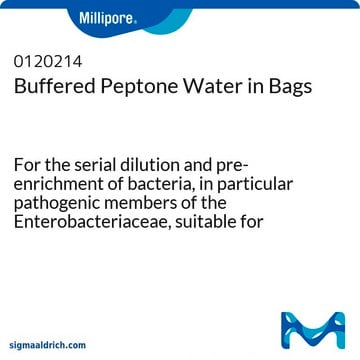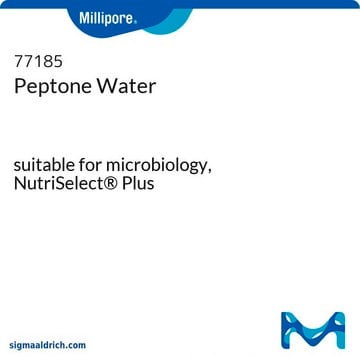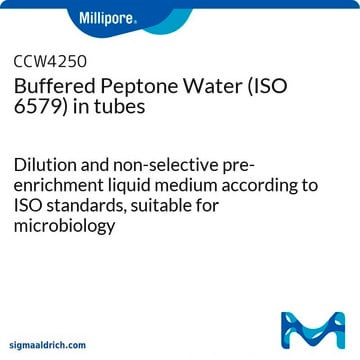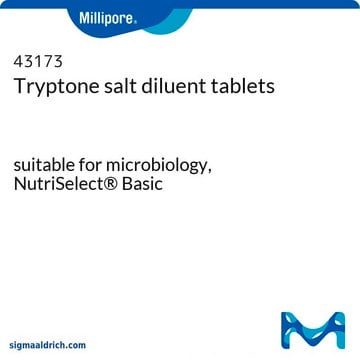77187
Buffered Peptone Water
NutriSelect® Plus, powder, pack of 500 g or 25 kg, pack of 500g or 25kg, non-sterile
Synonyme(s) :
BPW, Buffered Peptone Water, Tryptone Phosphate Water
About This Item
Produits recommandés
Agence
according to GB 4789.30-2016
according to GB 4789.40-2016
according to ISO 21528-1:2017
according to ISO 22964:2017
Niveau de qualité
Stérilité
non-sterile
Gamme de produits
BioChemika
Forme
powder
Durée de conservation
limited shelf life, expiry date on the label
Composition
disodium hydrogen phosphate, 3.5 g/L
peptone, 10 g/L
potassium dihydrogen phosphate, 1.5 g/L
sodium chloride, 5 g/L
Fabricant/nom de marque
NutriSelect® Plus
Conditionnement
pack of 500 g or 25 kg
pack of 500g or 25kg
Technique(s)
microbe id | specific enzyme detection: suitable
microbiological culture: suitable
Couleur
faintly beige Powder, Homogeneous, free-flowing powder
clear faintly brownish-yellow Prepared media, without any precipitate
pH final
7.2±0.2 (25 °C)
Application(s)
environmental
food and beverages
microbiology
pathogen testing
sample preparation
Adéquation
Providencia spp.
nonselective for Citrobacter spp.
nonselective for Cronobacter spp.
nonselective for Escherichia coli
nonselective for Klebsiella spp.
nonselective for Proteus spp.
nonselective for Pseudomonas spp.
nonselective for Salmonella spp.
nonselective for Shigella spp.
nonselective for Staphylococcus spp.
nonselective for Streptococcus spp.
nonselective for Yersinia spp.
nonselective for bacteria (General Media)
nonselective for coliforms
nonselective for enterobacteriaceae
Vous recherchez des produits similaires ? Visite Guide de comparaison des produits
Description générale
Application
Notes préparatoires
Stockage et stabilité
- Store prepared media below 8°C, protected from direct light.
- Store dehydrated powder, in a dry place, in tightly sealed containers at 2-25°C.
Autres remarques
Note de bas de page
The designations basic, plus, or prime are added to indicate the quality control level, from basic quality control to standard QC plus to prime for full regulatory compliance.
Informations légales
Code de la classe de stockage
13 - Non Combustible Solids
Classe de danger pour l'eau (WGK)
WGK 3
Point d'éclair (°F)
Not applicable
Point d'éclair (°C)
Not applicable
Équipement de protection individuelle
Eyeshields, Gloves, type N95 (US)
Choose from one of the most recent versions:
Déjà en possession de ce produit ?
Retrouvez la documentation relative aux produits que vous avez récemment achetés dans la Bibliothèque de documents.
Les clients ont également consulté
Articles
Cronobacter spp. are frequently found on vegetables, meat, fermented bread, dairy and in baby food. Consumption of contaminated powdered infant formula milk can result in sepsis, infant meningitis and necrotizing enterocolitis.
An article concerning the detection, identification, differentiation, and cultivation of Pseudomonas species.
Streptococci- Overview of Detection, Identification, Differentiation and Cultivation Techniques
Protocoles
General guidance for the detection and enumeration of Enterobacteriaceae in food according to EN-ISO 8523:1991 and EN-ISO 4832:1991, respectively.
Notre équipe de scientifiques dispose d'une expérience dans tous les secteurs de la recherche, notamment en sciences de la vie, science des matériaux, synthèse chimique, chromatographie, analyse et dans de nombreux autres domaines..
Contacter notre Service technique











